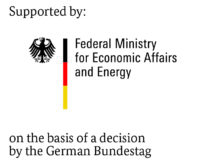Nonwoven Evaporator
Influence of fuel composition on residue formation during evaporation of liquid fuels in porous media
Brief description
Due to climate policy challenges and the development of a greenhouse gas-neutral energy supply, substantial innovations have been occurring in the energy market for several years. Renewable, climate-neutral fuels are an alternative to electrification of applications in the areas of mobility, heating and cooling. The variety of alternative energy sources that can be used to supplement and replace fossil fuels is increasing due to steady expansion of the raw materials and synthesis routes used for their production. Examples include the transesterification of vegetable and animal oils and used fats to fatty acid methyl esters (FAME), the hydrogenation of vegetable oils (HVO), and the synthesis of saturated hydrocarbons with synthesis gas from biomass (biomass-to-liquid, BtL). The growing diversity of these middle distillates also results in a greatly increased spectrum of physicochemical properties of these energy carriers. In addition, these properties can change over the course of longer storage times in tanks.
In order to be able to use the alternative middle distillates and their blends with fossil fuels in an operationally reliable manner despite their diverse range of properties, they must be compatible with the existing infrastructure and heating system inventory. Since they comply with the specifications in the standards (e.g. DIN 51603-1, DIN SPEC 51603-6, DIN EN 590, DIN EN 14214, DIN EN 15940), they fulfill an important prerequisite for their suitability for use. However, both their lower density and as yet unclear causes of interactions when mixed with fossil middle distillates pose challenges for the operational safety of existing heating appliances.
Aims of the project
This research project aims to identify the chemical-physical causes of residue formation during evaporation of liquid fuels in porous media, validate the results, determine the influence of relevant factors, and develop possible prevention strategies from this information. The knowledge, experimental facilities and analytical methods developed and obtained in a previous project will be used and further developed.
Work tasks OWI
- Long-term storage of fuels under defined conditions
- Modification and commissioning of an idealized test apparatus for film evaporation / deposit formation in hot porous media
- Validation of the deposit causing components
- Development of avoidance and regeneration strategies
- Mathematical modeling of the evaporation behavior of the fuels
Project Partners
- Chair of Technical and Analytical Chemistry at the Institute of Chemistry of the University of Rostock
- OWI Science for Fuels gGmbH
Project funding
The IGF project 21317 BG of the research association German Society for Petroleum and Coal Science and Technology e.V. – DGMK, Überseering 40, 22297 Hamburg was funded through the AiF as part of the program for promoting joint industrial research (IGF) by the German Federal Ministry of Economics and Energy based on a German Federal Parliament resolution.

Project duration
October 2020 until March 2023
Contact
M.Sc. Oliver Zöllner
Phone: 02407/ 9518-116
e-Mmail: O.Zoellner@owi-aachen.de
